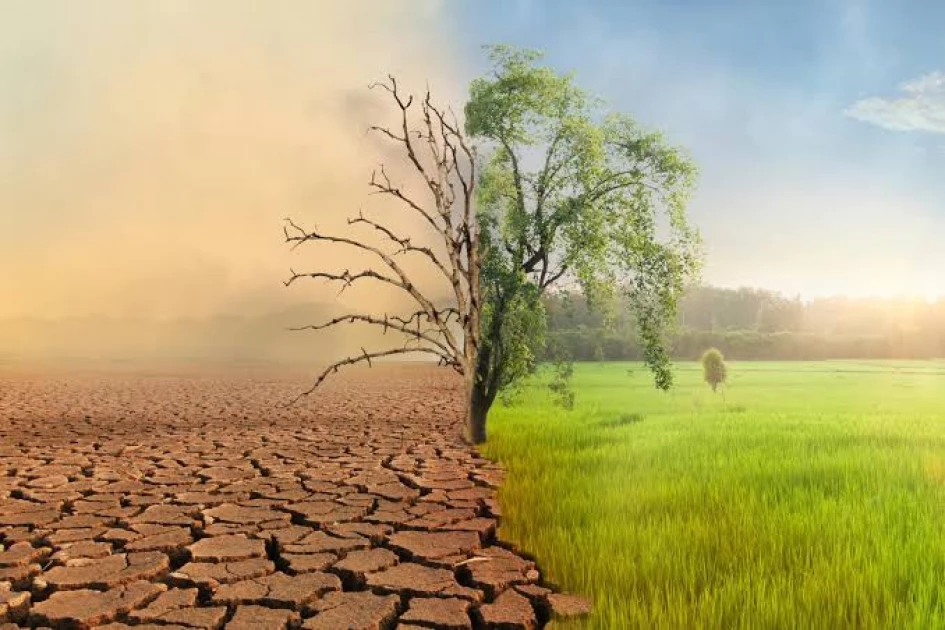OPINION: Demystifying Kenya's Climate Change problem from a development economist's lens


Climate change is unquestionably one of the most pressing issues currently confronted by all countries globally.
It does not matter the economic status of any country as it has worldwide consequences that affect diverse regions in distinct, often extreme ways.
Scientists agree that human activity is the cause of this shift and its significant effect on the planet. It is a threat to development, and it is essential to address this issue to achieve sustainable development.
In Kenya, recent statistics support the need to address climate change to safeguard the country’s environment, economy as well as the well-being of its people. Temperature trends are the most evident signal of climate change. Kenya has documented a notable rise in temperatures in the past few decades.
The Kenya Meteorological Department registered an average temperature increase of approximately 0.3 to 0.6 degrees Celsius per decade. This seriously impacts the country’s core sectors, such as agriculture and water resources.
These impacts are often more severe in Kenya, as these countries can less adapt to the changing climate.
Agriculture, a cornerstone of Kenya's economy and livelihoods for many, is deeply vulnerable to climate change. Erratic rainfall patterns and prolonged droughts have become more common. The Kenya Food Security Steering Group reported that over 2.8 million people were facing acute food insecurity in 2021 due to the combined impacts of climate-related shocks and the ongoing COVID-19 pandemic.
Such statistics highlight the dire consequences of climate change on food production and access, especially for rural communities.
The country has also been facing altered rainfall patterns. Changes in precipitation patterns often lead to unpredictable and uneven rainfall distribution. This results in longer dry spells, shorter growing seasons, and shifts in planting and harvesting times, which affect crop yields and quality.
Water scarcity is another pressing issue exacerbated by climate change in Kenya. Water is essential for agriculture, industry, and human health. The country's primary water sources, including rivers and lakes, are experiencing decreasing water levels.
Lake Turkana, for instance, which is the world's largest desert lake and a vital water source for communities in northern Kenya, has seen its water levels decline drastically in recent years.
According to the National Drought Management Authority, over 2.1 million people were affected by drought in Kenya in 2021, further exacerbating water scarcity-related challenges. Reduced water availability leads to crop failures, livestock losses, and food insecurity, posing significant challenges to rural livelihoods.
Extreme weather events, including draughts, floods, and heavy rains, are also rising. Kenya has experienced several devastating floods in recent years, leading to displacement, infrastructure damage, and loss of lives.
In 2020 alone, heavy rains and flooding affected over 400,000 people and claimed over 260 lives, according to the Kenya Red Cross. These events disrupt communities, strain resources, and hinder development efforts. Climate change has been associated with higher drought events in Kenya.
These droughts severely affect water availability, agriculture, and ecosystems. Reduced rainfall and higher evaporation rates due to rising temperatures contribute to more frequent and prolonged periods of water scarcity. Not only are droughts becoming more frequent, but they are also becoming more severe in some cases.
Higher temperatures can intensify drought by increasing evaporation rates, drying water sources, and stressing ecosystems.
The impact of climate change isn't confined to the environment and immediate disruptions; it has a ripple effect on the economic and social spheres. Losses in agricultural productivity, increased health risks due to changing disease patterns, and damage to infrastructure result in economic setbacks.
The World Bank estimates that the cost of adapting to climate change in Kenya could reach around 2-3% of the country's GDP annually by 2030.
A development economics lens is essential when considering the impacts of climate change. This is because the effects of climate change are unevenly distributed. They are often more severe in developing countries, which are less able to adapt to the changing climate. It also helps to understand the nexus between climate change and other development challenges.
For example, climate change can lead to increased poverty, food insecurity, and conflict.
By taking a development economics lens, we can better understand the challenges of climate change and develop practical solutions. We need to take a comprehensive approach to addressing climate change.
This means reducing greenhouse gas emissions, adapting to the effects of climate change, and investing in climate-resilient development. There is also the need to ensure that the benefits of climate action are shared equitably.
This means ensuring that developing countries like Kenya have the resources to adapt to climate change's effects and build climate-resilient economies.
Climate change is a complex challenge, but it is one that we can overcome. By taking a comprehensive approach and working together, we can build a more sustainable future for all.
Kenya has taken steps to address climate change and build resilience.
The country's National Climate Change Action Plan (NCCAP) outlines strategies to mitigate greenhouse gas emissions and adapt to changing climate conditions.
Kenya's commitment to renewable energy is also evident, with investments in solar and wind power contributing to the country's goal of achieving 100% clean energy by 2020.
The need for climate action is expeditiously needed. Kenya's efforts to mitigate and adapt to these challenges are commendable.
However, the complex nature of the issue requires continued collaboration, innovation, and global solidarity to secure sustainable and resilient development for the country and its people.
The writer, Phillip Ndung’u, is a climate resilient champion.
He holds an MSc in Development Economics.
Want to send us a story? SMS to 25170 or WhatsApp 0743570000 or Submit on Citizen Digital or email wananchi@royalmedia.co.ke
Comments
No comments yet.


Leave a Comment